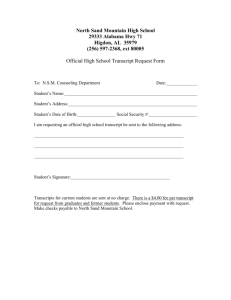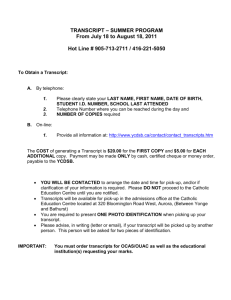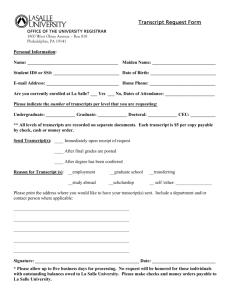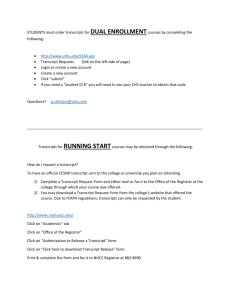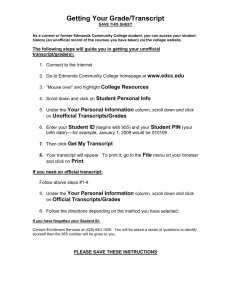LegalXML Transcript Charter
advertisement
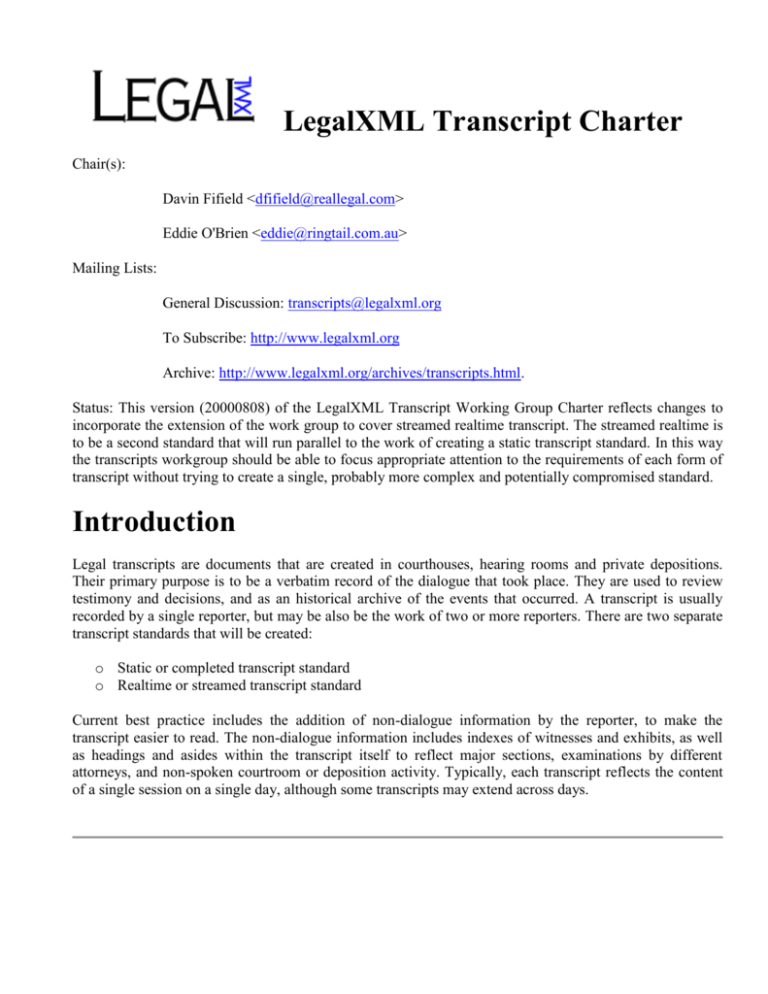
LegalXML Transcript Charter Chair(s): Davin Fifield <dfifield@reallegal.com> Eddie O'Brien <eddie@ringtail.com.au> Mailing Lists: General Discussion: transcripts@legalxml.org To Subscribe: http://www.legalxml.org Archive: http://www.legalxml.org/archives/transcripts.html. Status: This version (20000808) of the LegalXML Transcript Working Group Charter reflects changes to incorporate the extension of the work group to cover streamed realtime transcript. The streamed realtime is to be a second standard that will run parallel to the work of creating a static transcript standard. In this way the transcripts workgroup should be able to focus appropriate attention to the requirements of each form of transcript without trying to create a single, probably more complex and potentially compromised standard. Introduction Legal transcripts are documents that are created in courthouses, hearing rooms and private depositions. Their primary purpose is to be a verbatim record of the dialogue that took place. They are used to review testimony and decisions, and as an historical archive of the events that occurred. A transcript is usually recorded by a single reporter, but may be also be the work of two or more reporters. There are two separate transcript standards that will be created: o Static or completed transcript standard o Realtime or streamed transcript standard Current best practice includes the addition of non-dialogue information by the reporter, to make the transcript easier to read. The non-dialogue information includes indexes of witnesses and exhibits, as well as headings and asides within the transcript itself to reflect major sections, examinations by different attorneys, and non-spoken courtroom or deposition activity. Typically, each transcript reflects the content of a single session on a single day, although some transcripts may extend across days. Table of Contents Mission Statement Scope o Requirements o Constraints o Demonstration Applications Deliverables Duration and Milestones Confidentiality Coordination with Other Groups Communication Mechanisms o Group Home Page o Mailing List o Teleconferences o Face to Face Meetings Decision Procedure Participants Mission Statement The mission of this working group is to develop: 1. an XML compliant syntax for representing legal transcript documents either as stand-alone structured content, or as part of other legal records. 2. an XML compliant syntax for representing realtime streamed legal transcript. Such transcripts will be able to provide access to the verbatim record, and any meta-information that is important within the context of that transcript. Scope The core scope of this activity will be in specifying the necessary data model of legal transcripts and realtime streamed transcripts and the syntax of their representation in XML. The working group's core activities are: 1. Defining a data model that describes current transcript formats for both static and realtime. 2. Using the transcript data model to design the Proposed Recommendation of the LegalXMLTranscript standard. 3. Documenting the working group's position on citation to transcripts with a LegalXML note. 4. Define the charter for subsequent work once (1-3) have been achieved. Requirements The Working Group must meet the following requirements: 1. Coordinate with other LegalXML recommendations, in particular in the areas of Horizontal tags, Citation and Signatures. (See Coordination) 2. After being advanced to Proposed Recommendation, implement the mandatory portions of the specification in at least two independent implementations. The following requirements must be met by the LegalXML-Transcript standard the Working Group develops: 1. Specify a minimum set of tags that all LegalXML –Static and realtime Transcript documents must contain. 2. Permit the accurate and unambiguous capture of the spoken dialogue being transcribed. 3. Ensure that the chronological order of the content within the transcript is explicitly preserved. 4. Contain a useful and extensible base set of tags for representation of non-dialogue transcript information. 5. Handle all legal transcripts, regardless of transcription method. 6. Ensure that transcripts both with and without non-dialogue information can be easily represented. 7. Support unambiguous paper or electronic citation to both locations and ranges within transcripts. 8. Where electronic citation is not possible, ensure that excerpts of transcripts can be easily represented within other documents. 9. Support time stamping of the content. 10. Support simultaneous page/line and structure-based organization of content. 11. Support the use of the signature standard adopted by LegalXML to represent certification of the transcript. 12. Use LegalXML Horizontal working group tags where appropriate, including appropriate Citation standards. 13. Permit external entities such as exhibits to be referred to within the Transcript. 14. Make use of W3C standards where appropriate. 15. Support non-English languages. 16. Define a sufficient representation of the certified transcript, through a stylesheet or some other appropriate mechanism. Constraints The working group will not directly address the following issues: 1. 2. 3. 4. Untranslated transcripts (stenographic notes) Versioning of transcripts, including judicial interference in the transcript content. A mandate for electronic or digital signing of the transcript. Requirements for on-screen or printed transcript presentation, except insofar as existing page/line and header/footer representation will be permitted. 5. Workflow before, during or after a transcribed session Future Considerations 1. Define an extended set of LegalXML-Transcript tags to support advanced implementation features. Demonstration Applications It is hoped that the following applications being developed by members of the WG will provide a useful test of the completeness: 1. realLegal.com Transcript Repository v1.0 2. To be determined. Deliverables This working group will deliver the following: LegalXML Working Draft identifying the requirements and data-model of legal transcripts being considered by the working group. LegalXML Proposed Standard for the representation of transcript in XML. LegalXML Unofficial Note documenting a set of test cases for interoperability testing. Once accepted by the appropriate LegalXML committee, the Recommended Standard for LegalXML Transcript. If appropriate, charters for further work. Duration and Milestones Currently, its expected lifetime for this workgroup is from December 1999 through Apr 2001. The events that have now passed are marked in bold below. Dec 99 WG chartered Jan 00 First Requirements Draft Jan 00 Meeting to discuss Data Model (after LegalTech NY, 27th Jan) Feb 00 Last Call for Data Model; becomes a Note Feb 00 First Static Syntax Working Draft Mar 00 One day FTF Meeting in Atlanta, March 2nd May 00 Second Static Syntax Working Draft Jun 00 Working group web-site available Sep 00 Static Sample Transcripts available on WG Web site Oct 00 Last Call for Static Syntax Working Draft of Static Oct 00 Realtime Data Model (Requirements) First Draft Nov 00 Interoperability Test Cases and Results document Finalized Nov 00 Last Call for Static Syntax Working Draft Dec 00 Interoperability Test Cases and Results for Static Standard Nov or Dec 00 Face-to-face meeting TBD based on General Legal schedule Jan 01 Realtime Data Model Finalized; becomes a Note Jan 01 Last Call for Proposed Static Standard; submitted to Legal XML Standards Committee Jan 01 FTF Meeting TBD during LegalTech NY, Jan 2001) Feb 01 First Realtime Syntax Working Draft Mar 01 Meeting to discuss RealTime Syntax Working Draft (TBD) Apr 01 Last Call for Proposed Realtime Standard; submitted to Legal XML Standards Committee Apr 01 WG reissues charter if appropriate Once established, the Working Group can decide to reschedule tasks that do not have to meet deadlines imposed by other groups. However, the schedule must fit into the total timeframe given above. Also, document dates may not be rescheduled without notifying the LegalXML Director. Confidentiality This charter and the mailing list and archives of the Working Group will be accessible to all members and observers of LegalXML. Coordination with Other Groups The activity of the working group has dependencies on other LegalXML working groups. During Last Call, a chair of the WG will procure reviews from the following LegalXML WGs before the specification will be advanced further: 1. LegalXML Legal WG: The objective of the Legal Working Group is to establish overarching standards for the way in which XML will be used by each of the LegalXML working groups. 2. LegalXML Court Filing WG: The Court Filing Working Group is designing XML standards for documents filed as court submissions. In so far as transcripts or a portion thereof may constitute some part of those submissions, this working group will have an interest in participating in the establishment of the LegalXML-Transcript standard, and said standard must be capable of conforming to the filing standards they develop. Communication Mechanisms Working group members are expected to participate in an electronic mailing list, periodic teleconferences and face-to-face meetings. The sole WG consensus venue is the mailing list. Group Home Page The group currently does not have a home page. The LegalXML home page is at: http://www.LegalXML.org Mailing List Participants must subscribe to and participate in the transcripts@legalxml.org mailing list. The archive is at http://www.legalxml.org/archives/transcripts.html. Teleconferences There are expected to be one or two teleconferences held at times to be set by the chairs. The exact frequency of calls will be determined by working group consensus. A chair is responsible for producing an agenda at least 24 hours in advance of each call, posting it along with the call details to the mailing list, and causing minutes of the call to be posted promptly after the call. Face-to-Face Meetings The working group will have a Face-To-Face meeting in Nov or Dec 00 Face-to-face meeting TBD based on General Legal schedule which is yet to be agreed. The working group will have a Face-To-Face meeting after LegalTech NY (January 2001). At least one-week prior notice of meetings, a two-day advance agenda, and posting of minutes no longer than 1 week after the meetings are required. Decision Procedures The working group itself will operate by consensus as provided in the LegalXML Operating Rules. Participants Participation in the working group is open. The LegalXML-Transcript Working Group will be co-chaired by Eddie O'Brien (Ringtail) and Davin Fifield (realLegal.com). Participation from court reporters from different states, as well as internationally, is particularly welcome and needed for the working group to succeed in its goals.

